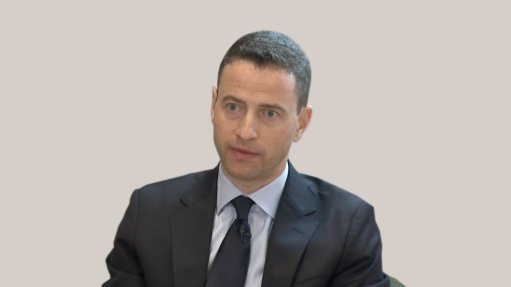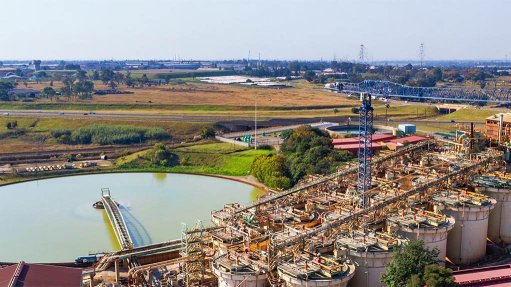Local gas supplies not likely to come on stream in time for South Africa to avoid a 'gas cliff'
Although gas is widely regarded as a necessary part of South Africa’s future energy mix, Presidential Climate Commission (PCC) head of mitigation Steve Nicholls is not convinced that a reliable source of local gas supply will be brought to bear in time for the approaching “gas cliff”.
The country is, therefore, likely to have to import gas from abroad at higher prices, he noted during a webinar on the role of gas in South Africa's energy transition, hosted by Creamer Media on March 13.
“People believe the Brulpadda and Luiperd [liquefied natural] gas (LNG) discoveries off the coast of South Africa to be further along the maturity spectrum than they are in reality. I'm not sure that we're going to get organised quickly enough to be able to get these resources on time. That may have a particularly large impact on industry, industry sustainability, and on those that are currently dependent on gas for their manufacturing,” he said.
He noted that developing these local gas finds would require large-scale investment that needed to be justified by equally large-scale demand, which he was not convinced was there.
“The key variable in developing these local gas resources is going to be whether there is sufficient demand to justify that kind of investment. If we can't get enough demand to land LNG, I can't see South Africa generating enough domestic demand to drive investment in that infrastructure,” he said.
Therefore, Nicholls said, South Africa would remain reliant on export demand, which would be priced in dollars and subject to severe price volatility.
“We are in this competition scenario. Whether those resources are financially viable or not depends on one’s assumptions around global demand, which depends on one’s assumptions about the speed at which countries around the world develop climate policies,” he said.
However, these difficulties did not negate the need that South Africa has for gas in securing a stable supply of energy.
Nicholls noted that the PCC recently carried out a review of major energy studies done by the University of Cape Town, the National Business Initiative, the Council for Scientific and Industrial Research and Bloomberg. Each of these looked at the role of gas in South Africa's energy future.
“All of those studies show that the cheapest electricity system going forward for South Africa is a combination of variable renewable energy, peaking support and storage, which can either be pumped hydro or batteries. The peaking support is predominantly gas across all the models. That is what they're all selecting,” he explained.
He confirmed that the PCC therefore definitely saw a role for gas in providing peaking support, which is essential for variable renewable energy systems to provide energy security.
“The options about where you get that gas, whether you source it locally or whether you import LNG is really the key topic of debate,” Nicholls noted.
He said the key challenge in this debate is the way that the future world is changing under climate conditions. He pointed to International Energy Agency projections for future electricity systems against a range of temperature goals.
“If you're going for a net zero scenario, whereby you’re phasing fossil fuels out of the economy by 2050, then gas demand drops off significantly by 2050. It at least halves, if not more than that,” he noted.
Therefore, if South Africa wants to develop domestic gas resources, it might not make sense competitively.
“You're competing against the cost advantage of shale gas in the US and you're competing against mega refineries [in Saudi Arabia]. Therefore, any investment decision you make in domestic supply is in that context in the long term. In the short term, it's unlikely that any domestic resources will be provided,” he said.
He said that, despite these conundrums, the need to resolve the short-term supply constraints that are leading towards the so-called “gas cliff” in a few years was rooted in LNG.
“The debate is how quickly can we get these LNG resources online, and whether it's sourced from Mozambique or through Kwa-Zulu Natal. However, we're stuck in the commercialisation. Although there was peaking support factored into the energy electricity studies, these are relatively small utilisation peaking plants and not enough to anchor major gas contracts,” Nicholls said.
Article Enquiry
Email Article
Save Article
Feedback
To advertise email advertising@creamermedia.co.za or click here
Press Office
Announcements
What's On
Subscribe to improve your user experience...
Option 1 (equivalent of R125 a month):
Receive a weekly copy of Creamer Media's Engineering News & Mining Weekly magazine
(print copy for those in South Africa and e-magazine for those outside of South Africa)
Receive daily email newsletters
Access to full search results
Access archive of magazine back copies
Access to Projects in Progress
Access to ONE Research Report of your choice in PDF format
Option 2 (equivalent of R375 a month):
All benefits from Option 1
PLUS
Access to Creamer Media's Research Channel Africa for ALL Research Reports, in PDF format, on various industrial and mining sectors
including Electricity; Water; Energy Transition; Hydrogen; Roads, Rail and Ports; Coal; Gold; Platinum; Battery Metals; etc.
Already a subscriber?
Forgotten your password?
Receive weekly copy of Creamer Media's Engineering News & Mining Weekly magazine (print copy for those in South Africa and e-magazine for those outside of South Africa)
➕
Recieve daily email newsletters
➕
Access to full search results
➕
Access archive of magazine back copies
➕
Access to Projects in Progress
➕
Access to ONE Research Report of your choice in PDF format
RESEARCH CHANNEL AFRICA
R4500 (equivalent of R375 a month)
SUBSCRIBEAll benefits from Option 1
➕
Access to Creamer Media's Research Channel Africa for ALL Research Reports on various industrial and mining sectors, in PDF format, including on:
Electricity
➕
Water
➕
Energy Transition
➕
Hydrogen
➕
Roads, Rail and Ports
➕
Coal
➕
Gold
➕
Platinum
➕
Battery Metals
➕
etc.
Receive all benefits from Option 1 or Option 2 delivered to numerous people at your company
➕
Multiple User names and Passwords for simultaneous log-ins
➕
Intranet integration access to all in your organisation



















